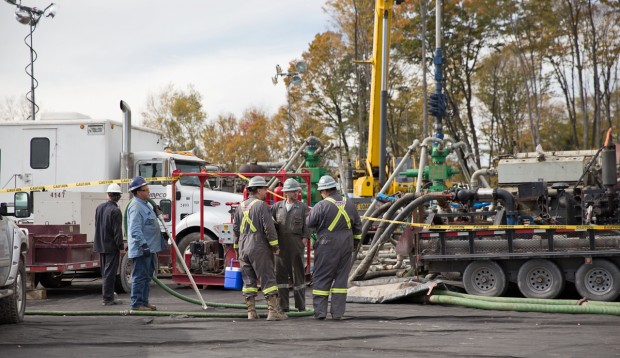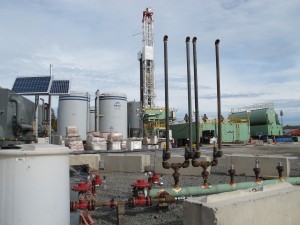Audit questions whether Pa. lawmakers understand fracking
-
Marie Cusick

Lindsay Lazarski / WHYY
A hydraulic fracturing (a.k.a fracking) site in Susquehanna County. Fracking is only one phase of shale gas extraction, but the word is often used as a catchall term for the entire process.
A key question during Pennsylvania’s natural gas boom centers on how much damage it’s done to water resources.
According to new information released this week by the state Department of Environmental Protection, water supplies around the commonwealth have been damaged by oil and gas operations 209 times since the end of 2007. This is the first time the agency has released such a tally.
Why did it wait so long?
According to state Auditor General Eugene DePasquale, it’s because the agency has been following the letter of the law, but not “the spirit of the law.”
As part of a highly-critical audit of the DEP unveiled Tuesday, DePasquale says he believes state legislators may not have understood the implications of some of the public disclosure language they approved in Act 13— Pennsylvania’s 2012 update of its oil and gas law.
The law requires the department to post an online list of “confirmed cases of subterranean water supply contamination that result from hydraulic fracturing.”
The key term here is “hydraulic fracturing”, which is frequently shortened to “fracking.”
“We believe the General Assembly may not have realized the implications of utilizing the very specific terms of ‘confirmed cases’ and ‘hydraulic fracturing,'” the auditors write. “[The legislature] may have unknowingly hampered, or even made, the provision of the law ineffectual.”
Although the word fracking is often informally used as a catchall term for the entire process of shale gas extraction, it’s actually just one phase of the development– it’s the injection of fluids at high pressure to break up the shale and release gas. According to the DEP, this phase of development has not been shown to contaminate groundwater.

Marie Cusick/StateImpact Pennsylvania
A drill rig in Susquehanna County. Drilling a well is a separate and distinct phase in the process of gas extraction that happens before fracking can occur.
Instead, water supplies have been damaged by other phases of gas extraction– including methane gas migration during the drilling phase. The DEP’s list of 209 damaged water supplies includes both unconventional and conventional oil and gas operations.
The tally does not reveal what caused the problems in each instance. It also includes cases of reduced water flow rates– which is not a contamination issue.
Drew Crompton is the top staffer for Senate President Pro Tem Joe Scarnati (R- Jefferson), and he was heavily involved in the passage of Act 13.
Crompton calls DePasquale’s suggestion that lawmakers didn’t understand the issue “nonsense.”
“We knew exactly what we were doing. We want people’s water to be protected,” he says. “Fracking was the issue— the direct actual production of the well was concerning for a lot of folks. That’s why the language was written that way.”
In its official response to the audit, the DEP makes a similar argument.
“DEP does not agree with the Auditor General’s interpretation that the term ‘hydraulic fracturing’ was intended by the legislature to refer to the entire well construction process,” its staff wrote. “DEP does not believe the legislature misunderstood the implications of the terms they specifically used.”
Crompton says many different groups had input into Act 13, and he can’t recall anyone ever taking issue with that section of the law, or the use of the term “hydraulic fracturing.”
“Nobody raised any questions when we wrote the language that way,” he says. “A lot of different groups and people viewed that language over the course of many months.”
He’s open to discussions about ways to broaden the language, but thinks it could be difficult to spell out precisely when the gas industry’s responsibility begins and ends.
“I think there’s a point to when you could stretch this language to be ineffective the other way—when does it start?” Crompton says. “Accidents do happen. People’s water –thankfully very, very occasionally–does get contaminated.”
















